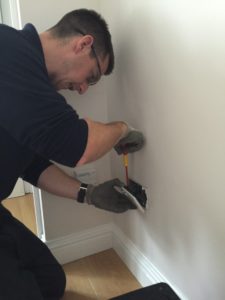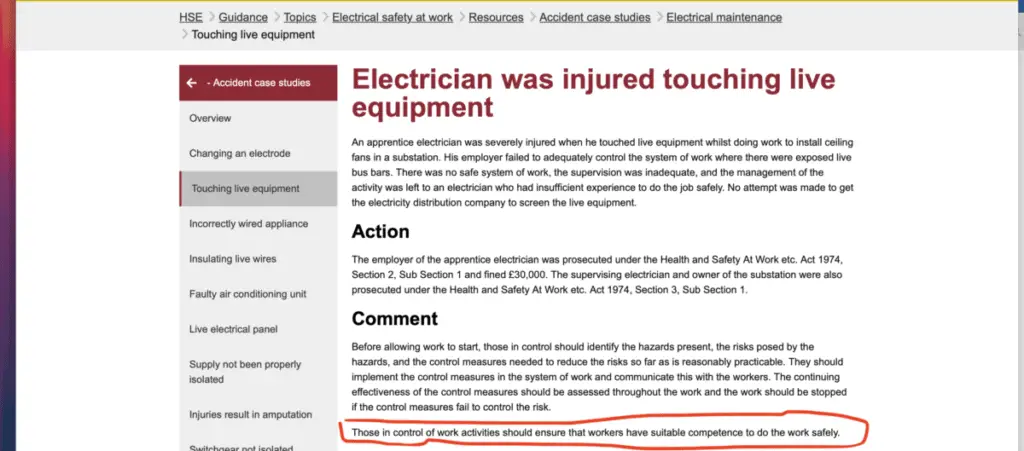Construction sites are often full of interesting characters who bring their own unique style of ‘banter’ to our work place. These sites can be good fun and it would be very hard to work alone in these environments. However, as electricians we don’t always work on construction sites and often find ourselves in smaller premises working alone.
Generally we try to take a mate with us as it usually makes life much easier (depending on the mate obviously) but sometimes we can be required to work alone.

The vast majority of electricians polled said that they regularly work alone. Although the majority prefer to work with another person, it can often be too expensive to have a co-worker with us, or there usually isn’t room for two electricians to be working in the same place at the same time.
In my experience, I prefer working with a partner but I often have to work alone. For example, If I have a fuse board to change there’s little point in having someone else there to help as the board is most likely located in a small cupboard that only one person can get in at a time.
In this situation a partner would be really helpful to help test the circuits when the work is complete but the added cost would mean that I would be priced out of many jobs.
The results of the electricians poll can be seen in the table below.
| As an electrician, do you ever work alone? | Number of sparkys |
|---|---|
| Yes, regularly | 11 |
| No, never | 2 |
| Occasionally | 1 |
Some electricians polled responded that no they never work alone which is worth looking at in more detail.
Should An Electrician Work Alone?
Some electricians feel that working alone is dangerous and should always be avoided. However, the Health and Safety Executive states that working alone is ok so long as a risk assessment is completed and procedures are in place to reduce some of the hazards associated with lone working.
This video from the HSE explains some of the factors that everyone (including tradesmen) working alone need to consider.
As with all guidelines from the HSE each electrician must interpret them how they see fit. As long as we feel we are not compromising our safety, there is no issue with working alone.
The main reason some electricians prefer to work with colleagues is that working with electricity is dangerous and it’s a good idea to have another person standing by incase we run into difficulty and need medical help.
Another reason for wanting a helper on hand is that many jobs are difficult when you’re flying solo. Trying to pull cables in, although it’s possible working alone, is an awful lot easier with two people.
These are both valid points and electricians are within their rights to argue that they should not be working alone. However, as the HSE rules state that it is acceptable, this leads many employers to take the attitude that working alone is ok for their employees and insist that they carry out work solo.
Can You Work Independently As An Electrician?
Electricians can work independently but they need to carry out a risk assessment and put procedures in place to ensure they have a rescue plan in case of an emergency. Staff welfare is very important and any electricians working alone should be aware of their rights and responsibilities.
The main challenge with working independently is having no one to help with tasks that are far easier accomplished by two people.
As an independent electrician we have no one to call on when we need to bounce ideas of each other or if we just need help for a day or two. Fortunately the community for electricians is pretty friendly and there are often other self employed sparks we can call on to help us out of a tight spot.
Is It Dangerous For An Electrician To Work Alone?

Working alone as an electrician is certainly possible and does not present a danger within itself. However, there are additional dangers that we must take into consideration.
The HSE sets out guidelines for protecting lone workers. I will link to their PDF document here. This highlights all the aspects lone workers need to take into consideration.
The main considerations that electricians working alone need to factor in are:
Having a monitoring system, this could be along the lines of checking in regularly via the phone with a colleague to let them know you are ok.
How the lone worker can raise an alarm in an emergency and administer first aid to themselves if needed
What emergency procedures can we put in place so the lone working electrician can get help if needed
We must also consider the mental health of the lone worker. Working alone for extended periods of time can have a negative affect on some people so it is important this hazard isn’t overlooked.
All these points to consider leaves many to feel it’s best for electricians to never work alone.
Do Electricians Work Together?
Electricians will work together wherever possible. As well as making the job easier it reduces many of the safety concerns associated with working alone. However, the cost implications can make working together prohibitive in certain situations.
We can see from the previous topic that it is much safer for electricians to work together. Unfortunately the cost implications of having two electricians on the job all the times can make some work untenable on this basis.
If a fuse board needs changing in a customers house, they are unlikely to want to pay the cost for two electricians as the price they would have to charge to do the job is effectively doubled. The customer is unlikely to be impressed at the sight of one of the electricians watching the other work as they can’t both work on the board at the same time.
Explaining to the customer that the second man is there for safety reasons is unlikely to go don very well in the real world.
This leads a lot of electricians to take on an apprentice; they get the helping hand they sometimes need, avoids many of the lone working hazards, and gives them a little company along the way. Depending on the apprentice they can dramatically reduce the amount of hours we need to spend at work as well, as discussed in this article.
Employing an apprentice brings new hazards though. We are responsible for their actions whilst they are training and leaving them to work alone is another topic.
Can You Leave An Apprentice Electrician Unsupervised?
Apprentices should not be left to work alone unsupervised. When we employ an apprentice we have a duty of care for their welfare and the Health and Safety Executive states in their guidance that anyone being trained should be supervised.
This article linked here, and shown in the image, highlights the case where an electrician apprentice working alone was injured. After an investigation the HSE prosecuted the employer under the Health and safety at work act 1974 and fined them £30,000.

I have highlighted the passage in the image that states those in control of work activities should ensure workers have suitable competence to do the work safely. It would come down to an individual investigation as to whether or not the apprentice had suitable competence to be working alone if they where to get injured.
When I polled electricians, many say that they where left working alone as apprentices and it did them the world of good. Many even say they are happy to leave their apprentices working alone, so long as various safety factors have been covered.
It seems in conversation that many electricians think apprentices working alone is a vital part of them gaining the skills and experience they need. The task the apprentice will be doing plays a large part in the decision to leave them alone working. If it is a relatively low risk task, ie one that doesn’t involve making the electrical connections then many electricians are happy to take this risk.
Like all HSE guidance it’s open to interpretation and whether or not if an accident where to occur you’d feel happy arguing your point that all reasonable safety precautions and procedures had been put into place.
You can read more about the dangers of being an electrician linked here
